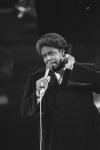Biography
Barry White, born Barry Eugene Carter (September 12, 1944 - July 4, 2003), was an American composer and singer-songwriter.
A two-time Grammy Award-winner known for his distinctive bass voice and romantic image, White's greatest success came in the 1970s as a solo singer and with the Love Unlimited Orchestra, crafting many enduring soul, funk, and disco songs such as his two biggest hits, "You're the First, the Last, My Everything" and "Can't Get Enough of Your Love, Babe."
Worldwide, White had many gold and platinum albums and singles, with combined sales of over 100 million, according to critics Ed Hogan and Wade Kergan. His influences include Rev. James Cleveland, Ray Charles, Aretha Franklin plus Motown artists The Supremes, The Four Tops and Marvin Gaye. Along with Isaac Hayes, White is considered by Allmusic.com as the first singer who played disco music before the actual period of the late 1970s.
Early life
Barry White was born Barry Eugene Carter in Galveston, Texas, and grew up in the high-crime areas of South Central Los Angeles. White was the elder of two brothers; his brother Darryl is 13 months younger. He grew up listening to his mother's classical music collection, and first took to the piano emulating what he heard on the records. His introduction to music later led to him playing piano on Jesse Belvin's hit single, "Goodnight My Love."
During his teenage years, White and his brother got involved with crime and gang activity. At age 17, he was jailed for four months for stealing $30,000 worth of Cadillac tires. While in jail, White listened to Elvis Presley singing "It's Now or Never" on the radio, an experience he later credited with changing the course of his life.
Music career
After his release from jail, he left gang life and began a musical career at the dawn of the 1960s in singing groups. He first released "Too Far to Turn Around" in 1960 as part of The Upfronts before going out on his own in the middle of the decade.
The marginal success he had to that point was as a songwriter. His songs were recorded by rock singer Bobby Fuller and TV bubblegum act The Banana Splits. He was also responsible for arranging "Harlem Shuffle" for Bob & Earl, and "I Feel Love Comin' On" by Felice Taylor, both of which became big hits in the UK. He discovered disco/soul artists, Viola Wills and Felice Taylor in 1965 and signed them to Mustang/Bronco Records, for which he was working as A&R manager for Bob Keane, the man who discovered Ritchie Valens.
In 1972, he got his big break producing a girl group he had discovered called Love Unlimited. Formed in imitative style of the Motown girl group The Supremes, the group members had gradually honed their talents with White for two years previously until they signed contracts with Uni Records. His friend Paul Politi hooked him up with music industry businessman Larry Nunes, who helped to finance their album. After it was recorded, Nunes took the recording to Russ Regan, who was the head of the Uni label owned by MCA. The album, 1972's From A Girl's Point of View We Give to You... Love Unlimited became a million album seller.
Soon after, Regan left Uni for 20th Century Records. Without Regan, White's relationship with Uni soured. With his relationship with Uni over and Love Unlimited contract-bound with the label, White was able to switch both his production deal and the group to 20th Century Records.
White wanted to work with another act but decided to work with a solo male artist. While working on a few demos for a male singer, he made three song demos of himself singing and playing, but Nunes heard them and insisted that he re-record and release them himself as a solo recording artist. After arguing for days about it, White was finally persuaded to release the songs himself although he was initially reluctant to step out in front of the microphone.
In 1973 White created The Love Unlimited Orchestra, a 40-piece orchestral group to be used originally as a backing band for the girl-group Love Unlimited. However, White had other plans, and in 1974 he released an album of their music titled Rhapsody in White, yielding the composition "Love's Theme". It was one of only a handful of instrumental recordings ever to do so.
After six years White left 20th Century in 1979 to launch his own label, Unlimited Gold, with CBS/Columbia Records. Although White's success on the pop charts slowed down as the disco era came to an end, he maintained a loyal following throughout his career. Despite several albums over the next three years he failed to repeat his earlier successes, with no singles managing to reach the Billboard Hot 100 except for 1982's "Change,". His label venture was exacting a heavy financial cost on White, so he concentrated on mostly touring and finally folded his label in 1983.
Illness and death
Overweight during most of his adult life, White suffered from various health problems especially in his final years. In particular, years of living with chronic high blood pressure and diabetes caught up with him, and he suffered kidney failure in the fall of 2002. While undergoing dialysis and awaiting a kidney transplant, he suffered a stroke in May 2003, which forced him to retire from public life.
At around 9:30 on the morning of July 4, 2003, White died at Cedars-Sinai Medical Center in Los Angeles after suffering from total renal failure.[8] His remains were cremated, and the ashes were scattered by his family off the California coast. On September 20, 2004, he was posthumously inducted into the Dance Music Hall of Fame at a ceremony held in New York. ..






